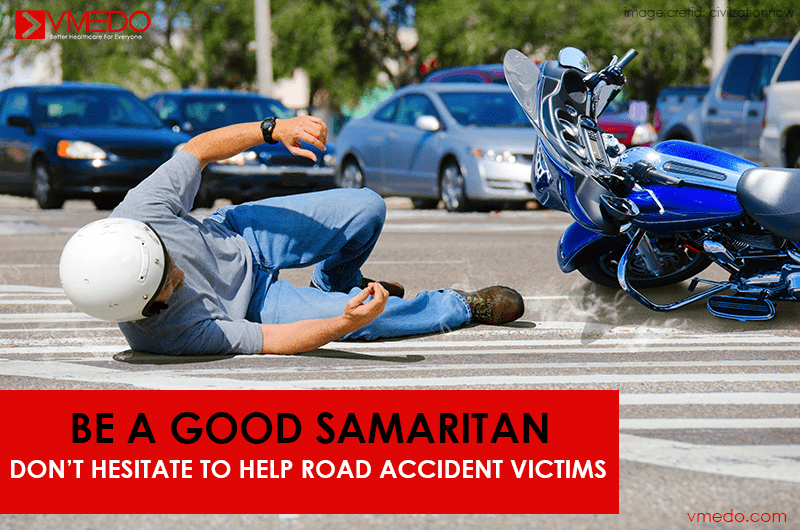She was a mother of two young kids, driving them off to the nearest summer camp. A lorry had hit her vehicle and there was blood everywhere.
The next thing she knew was that she was in the hospital with injuries to her hand and leg.
Her family shaken and scared but still intact.
Her dreams intact. Her life intact.She lived to tell her tale.
That she could be anyone, even you.
Her story has a happy ending only because someone decided to help them and get them emergency services.
But not everyone is lucky that way.
Majority of them die due to lack of knowledge and lack of awareness but not for lack of humanity.
Just imagine for a second you are lying on the road, bleeding and asking for help and people don’t even try to come to your aid.
Sad state of affairs is it not?
Lack of awareness and this dangerous fear of being tied up with legal and policy aspects of helping a person get aid during a medical emergency is two most defining factors that influence roadside death statistics.
What if I could tell you that a law exists that not only helps in making the affected person safe and also the one who helps. It’s called the Good Samaritans Law.
You can make that choice to save someone by acting on goodwill and call for an ambulance straight away. Rest assured you shall not be questioned about why you brought the person to the nearest hospital, the Supreme court has laid down its guidelines:
1.When you come forward voluntarily and takes an accident victim to a hospital and you will not be asked any questions by police or hospital and can leave immediately.
You cannot be forced to stay unless you are an eyewitness in which case only their address can be noted and no more questions shall be asked.
2. A bystander could be rewarded by the State government for helping the accident victim so as to encourage others to come out to the rescue of accident victims.
3. You will NOT be held for any criminal cases.
4. A bystander who calls and informs the police or ambulance or emergency service about the incident does not need to reveal his name or any other personal details on the phone or in person.
5. In the Medico-Legal Forms that are provided by hospitals, it is their wish to provide their personal details.
6. The action shall be taken against those officials who constrain a bystander for revealing his/her personal details.
7. If a bystander is an eyewitness to the accident he/she can be examined as part of the investigation by police and this can be done only once, and during a time the Good Samaritan cannot be harassed.
8. The police investigation can be done only under Section 284, of the Code of Criminal Procedure 1973 or formally on affidavit as per section 296 of the same Code.
9. A Good Samaritan or any other eyewitness can be examined through video conferencing to protect them from any form of inconvenience.
10. The Ministry of Health and Family Welfare will issue guidelines to all prevent public and private hospitals to not detain good Samaritans or ask them to pay for registration and admission costs unless he/she is a family member of the victim who needs to be treated immediately.
11. If a doctor fails to help the accident victim when he is expected to provide care, then it’s considered as the “Professional Misconduct” as prescribed by the Indian Medical Council Regulation 2002″ and action will be taken against them.
12. These guidelines are published in all the hospitals in English, Hindi and the respected regional language stating that no good Samaritan will be asked to provide his/her personal details or fee for the admission of the victim.
13. If the Good Samaritan requires an acknowledgment letter for the confirmation on admitting the injured person to the hospital, then hospital shall oblige and provide the acknowledgment in accordance with the format prescribed by the State government.
14. These guidelines are enforced to all the public and private hospitals, and if they fail of which will lead to taking action against them.
15. These guidelines shall be issued by the Central and State Government and will be circulated to all hospitals and institutions. And guidelines will also be published in all newspapers including electronic media.
In case you want to help someone, who has met with an accident but do not know what to do since you have no first aid training.
You can use help them by staying calm and reassuring the person that help is on its way or use the medical guidelines that are quickly and easily available in the VMEDO app that provides you with details that can help you provide first aid for road accidents.
Also Read: Emergency transportation in India
You can never know what happens when, but you now know that if ever an accident does happen you can be the Good Samaritan without having to think too much.
After all, every life is important.
You can be that angel for someone’s life…
Stay aware and stay safe.
For every one hour, 17 road accident occurs in India. So, calling an emergency ambulance like 108 or 08067335555 or 093431 80000 could save a life.
Now You Know What Indian Law Says About Helping A Victim In Road Accident
So Don’t just stand there be a good Samaritan!!


